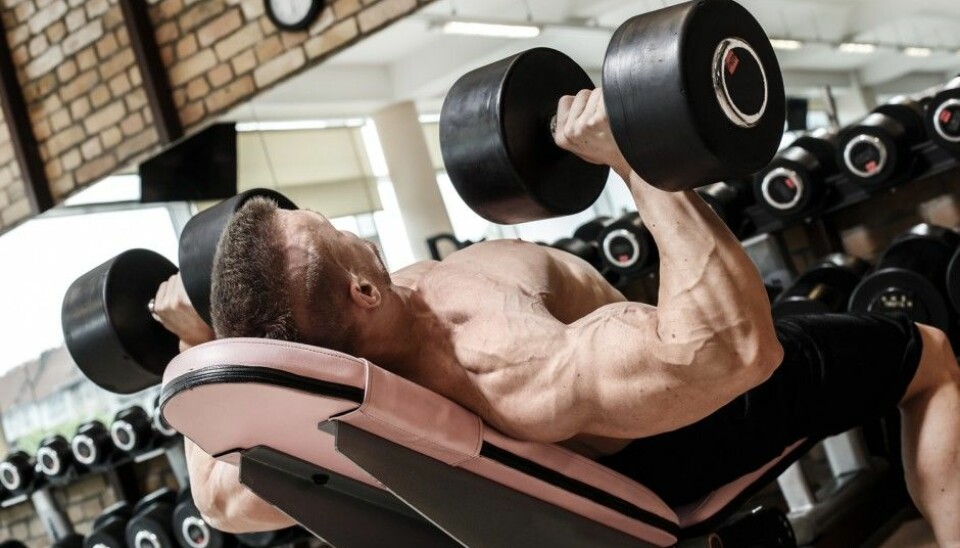
Bodybuilders on drugs might be a case of male identity crisis
These pumped-up bodies may hide deep insecurities, according to one researcher.
Bjørn Barland has spent the last 20 years studying the doping culture in bodybuilder gyms—from the inside. He says it's still acceptable in places to use drugs to build a big, strong body that is to be both admired and feared. Barland is a researcher from the Norwegian Police University College and has just released a book on the subject.
Many young men have fewer positive masculine role models to identify than in the past, and many also told Barland that doping gives them more self-confidence.
“Many of the men I interviewed said they used drugs as a means to win recognition and respect from other men, and to gain confidence and control,” Barland said.
Fredrik Langeland, who wrote his PhD thesis at the University of Stavanger on the roles of the Norwegian male in society today, said he believes doping and bodybuilding may be related to the need to have a well-muscled, hard body, which is important for many men.

“This type of body is associated with hardness, invulnerability, and an unwillingness to yield as protection from the outside world. At a time where men may feel vulnerable, an individual can build up his body as a shield against the outside world and as an expression of the values a hard body symbolizes,” says Langeland.
Langeland also says that many men probably feel a longing for a place where men can just be men in a world that gives increasingly less space to do exactly that. They want to avoid having to deal with real life.
Meaningful and logical in some communities
Barland has long wondered why some people choose to use bodybuilding drugs. Twenty years ago, he realized that if he wanted to understand the mindset in amateur bodybuilding circles, he would have to do more than interview users—he would have to look at the culture from the inside.
He went to bodybuilding studios and talked with bodybuilders at countless competitions. He writes about the culture and its strict diets, sweaty workouts and consumption of drugs, either via pills or injections.

“For many bodybuilders, doping is an important and logical part of the training process, in order to win competitions and pose at the gym,” explains Barland.
Three percent use drugs
The negative consequences of doping have been well publicized in the media, from the fact that it is cheating to the mental, physical and social effects of drug use among bodybuilders.
Nevertheless, roughly three per cent of bodybuilders continue to use anabolic steroids, testosterone and a variety of other drugs to build bigger muscles, both for fitness competitions and among amateur bodybuilders. Most are men.
Barland says that those who use drugs have slightly less education than average, and many are also more likely to be involved in violent crimes and substance abuse.
A symptom of an identity crisis
“For many this is not a doping problem, but may be a symptom of a lack of engagement in something else, or that doping has become the solution to other problems. They get involved in bodybuilding and doping so deeply that it becomes a passion,” says Barland.
Some lack male role models. For others, doping is a refuge from the reality that they are marginalized. They are part of a subculture that has formed because of changes in the role of men in society today.
But some people use drugs simply because they work, Barland says. These users see drugs as just another aspect of building the ideal body, in line with diet and exercise.
“Well, I do it (use drugs) for myself. But I also hear from very, very many mates and women friends that I have become tremendously huge. So it's really fun that people think I have become very large and have a lot of muscle,” said one of the bodybuilders that Barland interviewed.
Some in prison or dead
Many also admit that they have had side effects from their doping days.
"Life with steroids was in many ways amazing, but it went completely wrong. I stopped with my education, with work and with most of my social life. I traveled around to competitions and shows, used ephedrine and steroids in large doses and finally I went over to amphetamines. At that point, it didn’t take long before it was all over,” said one woman who Barland interviewed. She eventually got help and is OK.
But not everyone is as lucky.
Some are in prison or struggling with substance abuse and have moved on to more serious drugs, often amphetamines. And some are dead.
“Most people who have escaped this life cannot believe they wasted so many years on it. It has cost them a lot, but they say that the experience completely consumed them,” said Barland.
-------------------------------------
Read the Norwegian version of this article at forskning.no


































